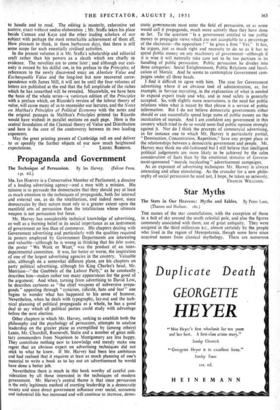Propaganda and Government
The Technique of Persuasion. By lan Harvey. (Falcon Press.
13s. 6d.) MR. IAN HARVEY is a Conservative Member of Parliament, a director of a leading advertising agency—and a man with a mission. His mission is to persuade the democracies that they should pay at least as much attention to the techniques of propaganda, both for internal and external use, as do the totalitarians, and indeed more, since democracies by their nature must rely to a greater extent upon the manifold arts of persuasion than the totalitarians whose ultimate weapon is not persuasion but force.
Mr. Harvey has considerable technical knowledge of advertising, as well as a burning belief in its social importance as an instrument of government no less than of commerce. His chapters dealing with Government advertising and particularly with the qualities required in posters employed by Government Departments are interesting and valuable—although he is wrong in thinking that his bete noire, the poster " We Work or Want," was the product of an inter- departmental committee. It was, for better or worse, the inspiration of one of the largest advertising agencies in-the country. Valuable also, although on a somewhat different plane, are his chapters on party political advertising, although his King Charles's head, Mr. Morrison—" the Goebbels of the Labour Party," as he constantly describes him—makes rather too Many appearances for the good of the argument. And when, turning from advertising to David Low, he describes cartoons as " the chief weapons of subversive propa- ganda " appealing through " cynicism, ridicule, hate and fear " one begins to wonder what has happened to his sense of humour. Nevertheless, when he deals with typography, lay-out and the tech- nical planning of political propaganda as a whole, he has a good deal to say which all political parties could study with advantage before the next election.
Other chapters in which Mr. Harvey, seeking to establish both the philosophy and the psychology of persuasion, attempts to analyse leadership on the greater plane as exemplified by (among others) Lenin, Mr. Churchill, Roosevelt, Stalin and a number of great mili- tary' commanders from Napoleon to Montgomery are less happy. They contribute nothing new to knowledge and merely make one regret that an obvious expert on advertising techniques did not stick to what he knew. If Mr. Harvey had been less ambitious and had realised that it requires at least as much planning of one's material to write a book as to lay out an advertisement he would have done a better job.
Nevertheless there is much in this book worthy of careful con- sideration by all those interested in the techniques of modern government. Mr. Harvey's central theme is that since persuasion is the only legitimate method of exerting leadership in a democratic society and since direct government influence- over social, economic and industrial life has increased and will continue to increase, demo-
cratic governments must enter the field of persuasion, or as some would call it propaganda, much more actively than they have done so far. To the question " Is a government entitled to use public money to propagate views which are not acceptable to a percentage of the electorate—the opposition ? " he gives a firm " Yes." It has, he argues, just as much right and necessity to do so as it has to spend public money on any machinery of government—although if it is wise it will naturally take care not to be too partisan in its handling of public persuasion. Public persuasion he divides into three categories: Social Enlightenment, Public Relations and Incul- cation of Morale. And he seems to contemplate Government cam- paigns under all three heads.
I find it difficult to agree with him. The case for Government advertising where it an obvious tool of administration, as, for example, in Service recruiting, in the explanation of what is needed to expand export trade and why, and in road safety is generally accepted. So, with slightly more reservations, is the need for public • relations when what is meant by that phrase is a service of public information. But I do not believe democratic governments either should or can successfully spend large sums of public money on the inculcation of morale. And I am confident any government in this country which tried to do so would soon find public opinion strongly against it. Nor do I think the precepts of commercial advertising, as for instance one to which Mr. Harvey is particularly partial, " Domination, Concentration, Repetition," have any proper place in the relationships between a democratic government and people. Mr. Harvey may think me old-fashioned but I still believe that intelligent political judgements are more likely to be achieved by the calm consideration of facts than by the emotional stimulus of Govern- ment-sponsored " morale inculcating " advertisement campaigns. As an exponent of advertising techniques Mr. Harvey is always interesting and often stimulating. As the crusader for a new philo- sophy of social persuasion he need not, I hope, be taken so seriously. FRANCIS WILLIAMS.






























 Previous page
Previous page